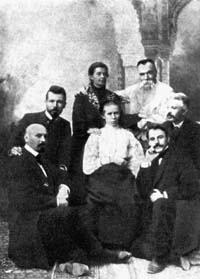On the centenary of unveiling the Ivan Kotliarevsky monument in Poltava

As long ago as 1898, Ivan Franko, Lesia Ukrayinka, Mykhailo Kotsiubynsky and other leading writers marked the centennial of the first publication of The Aeneid, emphasizing that Ukraine will always pay a generous tribute of eternal gratitude to Kotliarevsky who was among those who initiated the rebirth of his people’s venerable culture. Yet, it was only five years later in the early fall of 1903 that the long-awaited fete was held in Poltava, leaving a highly significant trace in our history.
The monument to Kotliarevsky was unveiled on Protopopovsky Boulevard, one of Poltava’s most beautiful streets. The poet’s bronze bust atop a tall pedestal was made by sculptors L. Pozen and A. Shirshov in the classic style (incidentally, the authors declined remuneration for their work). What made this feast a really great event was that it gathered, practically for the first time, the best representatives of the national intelligentsia from both Eastern and Western Ukraine. Recall some names from Ukraine’s great Pleiades: Lesia Ukrayinka, Vasyl Stefanyk, Mykhailo Kotsiubynsky, Borys Hrynchenko, Mykhailo Starytsky, Volodymyr Samiylenko, Filaret Kolessa, Hnat Khotkevych, Panas Myrny, Olena Pchilka... Only Ivan Franko seemed to be missing. We must emphasize the following stunning fact: out of the 7,000 people who donated funds for building the monument, 4,000 were ordinary Poltava province peasants. This alone more than amply proves that the Ukrainian people cherished and were prepared to develop and defend their mother tongue (contrary to the chauvinistic claims of latter-day interpreters).
Mykhailo Kotsiubynsky brilliantly expressed the sentiments of all those present, “The city of Poltava is now celebrating a feast of the Ukrainian word. A hundred years ago this neglected word, shoved under the thatched roof of a country house, rose again, like a phoenix from the ashes, in the mouth of Ivan Kotliarevsky, the father of modern Ukrainian literature, and resounded like thunder over the vast expanses.” Still, even then, in 1903, the native word was far from free. The Poltava province and city authorities received a secret order from the Empire’s Interior Minister von Pleve, worded “in the best traditions” of the notorious Ems Ukase 1876, which (to the kind attention of those who are trying to rescue the Russian language in Ukraine from some non-existent danger) was valid even 27 years later, at the time under discussion here. This order categorically prohibited using the Ukrainian language, as an “unnecessary and objectionable dialect,” during the ceremony unveiling the monument.
It is this fact that largely explains what happened on the evening of August 31, 1903. A Poltava theater hosted a meeting of the celebrants well after the unveiling ceremony. The main speech in honor of Kotliarevsky was delivered in Russian by philologist and historian Ivan Steshenko. Then the floor was given to Olena Pchilka who began to pronounce her brief address in Ukrainian. Poltava’s Mayor Aleksei Tregubov upbraided her, and Lesia Ukrayinka’s mother had to make the rest of her speech in Russian. Prominent historian Oleksandr Yefimenko presented a brilliant essay “Kotliarevsky and His Historical Circumstances.”
The conflict grew unexpectedly intense when Mykhailo Kotsiubynsky rose to the rostrum and paid tribute to Kotliarevsky again in Ukrainian. This is how Poltavsky vestnik described the following developments, “It was clear that Tregubov was losing patience. He interrupted the speaker several times, protesting against him using the Little Russian dialect (during a function in honor of the classic of Ukrainian literature — Author).” Then Poltavsky vestnik’s reporter said that when the next speaker, Chernihiv-based actress Olha Andriyevska, also began to read out a congratulatory address in Ukrainian, Tregubov cut her short rudely and announced that he categorically prohibited any further speeches in Little Russian.
The room was swept by a wave of subdued (and sometimes not so subdued) indignation. Kharkiv delegate Mykola Mikhnovsky, one of the great ideologists of Ukrainian national liberation struggle, asked boldly in Ukrainian, “Mr. Chairman, I also have a report to make in the Ukrainian language. Will I be allowed to read it?”
He was answered, “No, I forbid you and all those present here to do so!”
Thereupon Mikhnovsky, followed by the majority of the audience, took their congratulatory addressees out of the folders, threw the empty folders on the chairman’s table and walked out of the room.
It should be noted for the sake of objectivity that Russia’s most noble minds raised an indignant protest against this chauvinistic provocation. Vladimir Korolenko wrote in the journal Russkie zapiski, “The situation is that the language of Kotliarevsky and Shevchenko, which attracted foreign pilgrims to Russian Ukraine, is lawful in Austria only. It is banned in its homeland, in its cradle... This crude and savage episode seemed to be saying to foreign intellectuals: you consider our Ukraine the parent state of your culture and your language, but we oppose this; let all our Ukrainians who value the treasures of their mother tongue make pilgrimages to your Lviv, to your schools, museums, and universities. We will never tolerate this in this country. We would rather raise a new specter of ‘unreliability’ and ‘treason’.” Then Korolenko added indignantly about the “manifestations of vandalism in the past few years, such as closing Prosvita branches, Ukrainian-language newspapers and journals, and branding the most legitimate elementary cultural aspirations of the Ukrainians as a return to Hetman Mazepa.”
Yet, in spite of such obtuse chauvinistic harassment, the language of Kotliarevsky and great Shevchenko would always rise like a phoenix from the ashes. Now, too, when you hear the mean and primitive “reasoning,” such as “Yes, I am Ukrainian by passport, but if I begin speaking in Ukrainian, this will not add more sausage to the store shelves,” always remember the main thing: a people’s language is the soul of its freedom.






